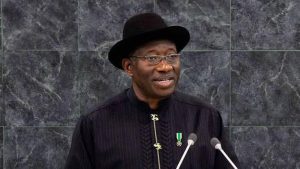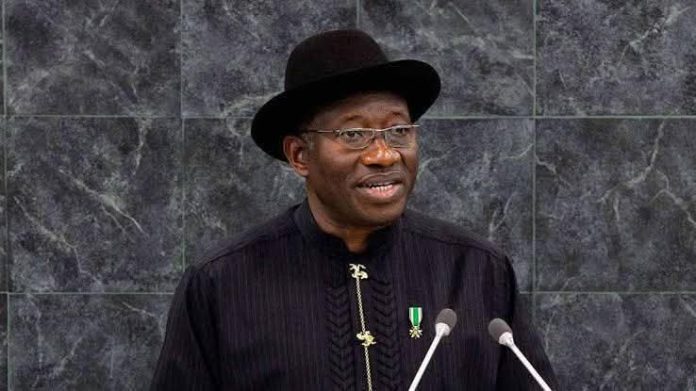
A fresh political and constitutional storm has erupted as a dramatic legal action has been filed before the Federal High Court in Abuja, seeking to bar former President Goodluck Ebele Jonathan from contesting in the 2027 presidential election. The suit, which could redefine Nigeria’s democratic trajectory, questions the eligibility of the former leader to once again seek the nation’s highest office.

The suit, marked FHC/ABJ/CS/2102/2025, was filed by a legal practitioner, Johnmary Chukwukasi Jideobi, who is urging the court to issue an order of perpetual injunction restraining Jonathan from presenting himself to any political party in Nigeria for nomination as a presidential candidate.
The Independent National Electoral Commission (INEC) and the Attorney General of the Federation (AGF) are also joined as co-defendants in the matter. The plaintiff seeks, among other reliefs, that the court prohibit INEC from accepting or publishing Jonathan’s name as a presidential candidate in the 2027 general elections, and compel the Attorney General to ensure strict enforcement of whatever order the court may grant.
At the heart of the suit lies a profound constitutional question: Is former President Goodluck Jonathan still eligible, under Nigerian law, to contest for the presidency?
The plaintiff’s argument revolves around the interpretation of Sections 1(1), (2), (3) and 137(3) of the 1999 Constitution (as amended). According to Jideobi, the Constitution explicitly limits the presidential tenure to a maximum of two terms—equivalent to eight years in office.
He contends that Jonathan, having first assumed office in 2010 following the death of President Umaru Musa Yar’Adua, and later being elected for a full four-year term in 2011, has already enjoyed the privilege of serving more than the constitutionally allowed duration.
The plaintiff further maintains that any attempt by Jonathan to seek the presidency again in 2027 would contravene the spirit and letter of the Constitution. If allowed to contest and possibly win, Jonathan would, by 2031, have served beyond the constitutionally prescribed limit—an act the plaintiff describes as a violation of Nigeria’s democratic safeguards.
Legal observers note that this case will likely test the judiciary’s interpretative strength regarding Section 137(3), which was inserted during the constitutional amendment process to prevent the possibility of prolonged incumbency or tenure elongation.
The filing of the suit has already sent ripples through the political establishment, reigniting debates about tenure limits and the political rights of former presidents. Analysts believe that if the Federal High Court grants the injunction, it could set a historic precedent, effectively disqualifying a former president from future contests based on constitutional interpretation.
For the Independent National Electoral Commission (INEC), the case presents a potential legal dilemma—whether to uphold a judicial injunction against a high-profile political figure or risk accusations of overreach if it proceeds with Jonathan’s potential nomination.
Prominent political actors have begun weighing in. Former Edo State Governor Adams Oshiomhole recently advised Jonathan against making another presidential bid, arguing that such a move might tarnish his legacy as a democratic statesman who voluntarily handed over power in 2015.
Political commentators, however, are divided. While some argue that Jonathan’s constitutional rights to seek elective office remain intact unless explicitly curtailed by the Supreme Court, others insist that allowing him to contest again would undermine Nigeria’s constitutional safeguards and set a dangerous precedent for indefinite political recycling.
Observers also warn that this legal tussle could heighten political tension ahead of the 2027 general elections, especially within the ruling and opposition blocs, as various power centers may interpret the case through partisan lenses.
The next step in the legal process will see the Federal High Court determine whether to issue an interlocutory injunction—a temporary order restraining Jonathan and other parties from taking further steps pending the determination of the substantive case.
Jonathan’s legal team is expected to mount a robust defense, likely anchored on the doctrine of fair hearing, constitutional rights to political participation, and precedents from previous court interpretations.
Analysts predict that regardless of the outcome at the trial court, the matter will almost certainly proceed to the Court of Appeal and possibly the Supreme Court, given its far-reaching implications for Nigeria’s political and constitutional order.
As the nation awaits the court’s ruling, public discourse continues to swell. The outcome of this case may not only determine whether Goodluck Jonathan can contest in 2027 but also shape the future boundaries of presidential eligibility under Nigeria’s evolving democracy.
